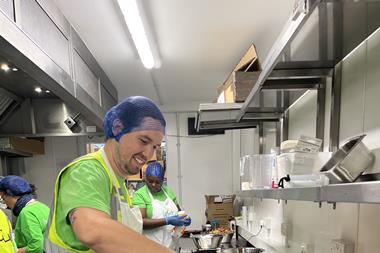True, attitudes have changed. And, as readers of The Grocer know, there are notable examples of enterprising manufacturers and producers who have long since seen the value of overseas business as an important cornerstone of their trade.
Add the arrival of Food from Britain with a thoroughly professional support mechanism for global selling for our teams of overseas salespersons, and you have a more encouraging scenario.
Yet, despite that, there are still serious challenges ahead before the entire British food and drink manufacturing base can truly raise its head with pride alongside the worldly wise and, more importantly, cash-muscled Sopexas and CMAs of this world.
For, despite his usual projection of optimism, plus some encouraging export figures, there was no disguising the frustration that tempered the words of FFB chairman Gordon Summerfield when he spoke in London recently.
He was right when he said overseas sales are all too often an afterthought, only surfacing when the firm has excess manufacturing capacity to unload. "It's too far away, and it's too expensive" are the dismissive words used by far too many sales directors when the notion of exports hits the boardroom debate. And therein lies FFB's problem.
Having attended virtually every world food show during the past four decades, I can say without hesitation that our overseas selling missions have come a long way since the occasional proactive salesman carried his samples bag across the Channel on the Calais ferry.
Our overseas partners rank well against the rest and the days of a few booths in the corner of a foreign exhibition hall are long gone.
Take a look at Walkers Shortbread, for example, whose tartan-encrusted effort has surely done more for the global cause of British food than anyone else. Or the enterprising Patak's Foods from Lancashire, which has proved that versatility and innovation are the order of the day in British food manufacturing. Significantly, both have done much to convince the doubtful Yanks, for example, of the invalidity of their perceptions that all British food is "bland junk".
But for every Patak's and Walkers, there are at least four or five others who have not made a commitment to exports, despite pleas from the ever-active FFB and an enthusiastic band of DEFRA ministers who have shown their often travel-shy predecessors that promoting British food in Tokyo and Cologne can be a worthwhile pastime.
Our total food exports in 2002 will have topped the £8.5bn of 2001 thanks in part to increased business with Europe, which was up 3%. But how much more attractive those figures would have been if more firms had been converted to the cause!
Perhaps the doubters should emulate the efforts of one of Britain's top food ambassadors, Tesco's Sir Terry Leahy, who has successfully taken his brand of British retailing expertise to far corners of the world. Mention Terry in Thailand and the locals beam with gratitude.
Or maybe the onus is on the government to raid its Treasury coffers and either stump up more cash to help Food from Britain (and that would be no bad thing), or given its penchant for such notions, maybe Whitehall and DEFRA in particular should appoint a food exports tsar' to work alongside FFB in a bid to convert the reluctant exporters?
Banging a few heads together in the food and drink manufacturing sector may just be the answer.
Either way, at the moment, as far too many of our companies miss a trick, the parent company, UK plc, is losing out to the more enterprising French and Germans. And that surely must not continue.
{{COMMENT - GUEST }}
Add the arrival of Food from Britain with a thoroughly professional support mechanism for global selling for our teams of overseas salespersons, and you have a more encouraging scenario.
Yet, despite that, there are still serious challenges ahead before the entire British food and drink manufacturing base can truly raise its head with pride alongside the worldly wise and, more importantly, cash-muscled Sopexas and CMAs of this world.
For, despite his usual projection of optimism, plus some encouraging export figures, there was no disguising the frustration that tempered the words of FFB chairman Gordon Summerfield when he spoke in London recently.
He was right when he said overseas sales are all too often an afterthought, only surfacing when the firm has excess manufacturing capacity to unload. "It's too far away, and it's too expensive" are the dismissive words used by far too many sales directors when the notion of exports hits the boardroom debate. And therein lies FFB's problem.
Having attended virtually every world food show during the past four decades, I can say without hesitation that our overseas selling missions have come a long way since the occasional proactive salesman carried his samples bag across the Channel on the Calais ferry.
Our overseas partners rank well against the rest and the days of a few booths in the corner of a foreign exhibition hall are long gone.
Take a look at Walkers Shortbread, for example, whose tartan-encrusted effort has surely done more for the global cause of British food than anyone else. Or the enterprising Patak's Foods from Lancashire, which has proved that versatility and innovation are the order of the day in British food manufacturing. Significantly, both have done much to convince the doubtful Yanks, for example, of the invalidity of their perceptions that all British food is "bland junk".
But for every Patak's and Walkers, there are at least four or five others who have not made a commitment to exports, despite pleas from the ever-active FFB and an enthusiastic band of DEFRA ministers who have shown their often travel-shy predecessors that promoting British food in Tokyo and Cologne can be a worthwhile pastime.
Our total food exports in 2002 will have topped the £8.5bn of 2001 thanks in part to increased business with Europe, which was up 3%. But how much more attractive those figures would have been if more firms had been converted to the cause!
Perhaps the doubters should emulate the efforts of one of Britain's top food ambassadors, Tesco's Sir Terry Leahy, who has successfully taken his brand of British retailing expertise to far corners of the world. Mention Terry in Thailand and the locals beam with gratitude.
Or maybe the onus is on the government to raid its Treasury coffers and either stump up more cash to help Food from Britain (and that would be no bad thing), or given its penchant for such notions, maybe Whitehall and DEFRA in particular should appoint a food exports tsar' to work alongside FFB in a bid to convert the reluctant exporters?
Banging a few heads together in the food and drink manufacturing sector may just be the answer.
Either way, at the moment, as far too many of our companies miss a trick, the parent company, UK plc, is losing out to the more enterprising French and Germans. And that surely must not continue.
{{COMMENT - GUEST }}













No comments yet